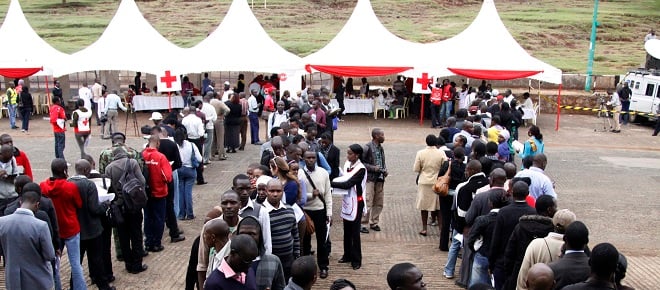Mall rampage unites determined Kenyans
Thousands in Nairobi wait for hours to donate blood
Khalil Senosi/AP
Share

“Sometimes you need to save a life and leave the ball, you know?”—Bobognongo Otiendo, Nairobi resident who donated blood instead of playing rugby
No one can understand a terrorist attack from a computer screen thousands of miles away. Such is the madness in Nairobi, where al-Shabab militants stormed a suburban mall and killed 68 people, wounded many more, and took who knows how many shoppers hostage. The first slideshows from inside Westgate mall were as mystifying as they were horrifying. How could such disturbing images emanate from a shopping mall, where the sound of gunfire only ever echoes from arcades? From here, everything’s incomprehensible.
If anything in Nairobi makes sense, it’s the reaction of people outside the mall. Thousands of people, Nairobians and foreigners alike, donated massive amounts of blood as the siege within the mall’s walls, where Kenyan forces took on the militants, dragged on. That knee-jerk reaction, donate blood because you can, would be heart-warming if it weren’t surrounded by so much death. Many of the people who lined up for five hours had lost friends or family in the mall attack.
Kenya, which represents a fairly stable nation on a continent that could use more of those, has endured its share of violence and unrest in recent times. Its deputy president, William Ruto, is on trial at the International Criminal Court for crimes against humanity related to post-election violence in 2008. In a bizarre twist, he was excused from the court to handle the hostage crisis.
Kenyan journalist Nanjala Nyabola, writing for Al-Jazeera, captures the complexity of the Kenyan struggle. “Beneath all the chaos are the stories that don’t sell newspapers or generate clicks per minute; stories that confirm that Kenyans continue to pull together in moments of crisis to help each other stumble along,” writes Nyabola. “We Kenyans fight a lot, but like all brothers and sisters, when need arises, we band together.”
What’s above the fold
| The Globe and Mail | A terrorist attack on a mall in Nairobi, Kenya has killed at least 68 people. |
| National Post | Most of the hostages held in Westgate mall have apparently been freed. |
| Toronto Star | Kenyan forces were determined to defeat the al-Shabab militants. |
| Ottawa Citizen | Two Canadians, including a diplomat, died in the Nairobi terrorist attack. |
| CBC News | Al-Shabab militants are still expected to hold some hostages. |
| CTV News | Four explosions hit Westgate mall as the crisis entered its third day. |
| National Newswatch | The New York Times criticized Stephen Harper‘s muzzling of scientists. |
What you might have missed
| THE NATIONAL | Spying. The Royal Canadian Navy was upset with the RCMP’s prosecution of spy Jeffrey Delisle, whose civilian trial exposed weaknesses in Canada’s military and intelligence apparatus. Had the navy court martialled Delisle, fewer details would have become public because the military controls which evidence remains behind closed doors. |
| THE GLOBAL | Iraq. Sixteen people died, and 35 were wounded, when a suicide bomber hit a funeral in a Sunni neighbourhood in Baghdad. Twenty-four people died in attacks around Iraq on Sunday, a day after 78 people were killed in twin bombings in Sadr City. UN special representative Gyorgy Busztin called the ongoing strife an “infernal spiral of violence.” |
| THE QUIRKY | Nuclear safety. A declassified document reports that a nuclear bomb inadvertently dropped over North Carolina on January 23, 1961 came within a last-ditch safety switch of detonating. Three of four safety measures failed, leaving a sensitive switch as the last defence against a four-megaton explosion that would have risked millions of lives. |